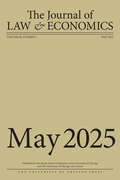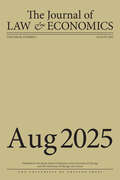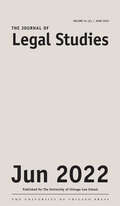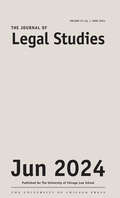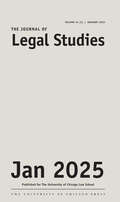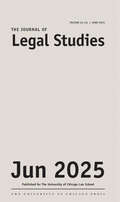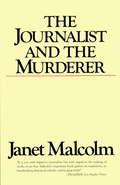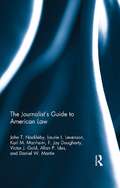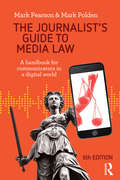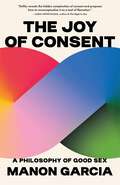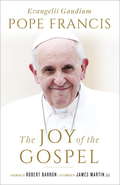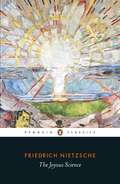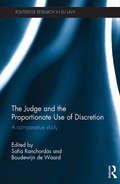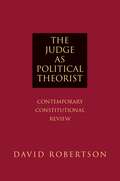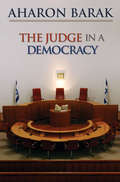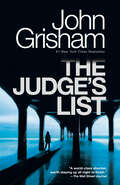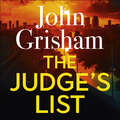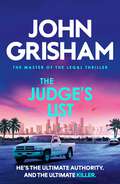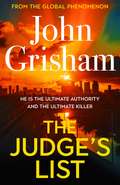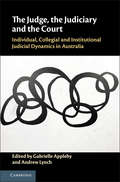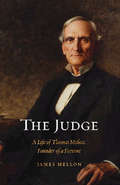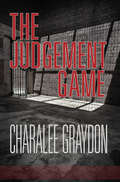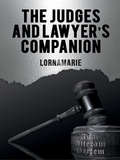- Table View
- List View
The Journal of Law and Economics, volume 68 number 2 (May 2025)
by The Journal of Law and EconomicsThis is volume 68 issue 2 of The Journal of Law and Economics. Established in 1958, the Journal of Law and Economics publishes research on a broad range of topics, including the economic analysis of law, the economic analysis of regulation and the behavior of regulated firms, industrial organization and antitrust policy, the political economy of legislation and legislative processes, law and finance, and corporate finance and governance. The JLE has published some of the most influential and widely cited articles in these areas. It is an invaluable resource for academics and those interested in cutting-edge analysis of current public policy issues.
The Journal of Law and Economics, volume 68 number 3 (August 2025)
by The Journal of Law and EconomicsThis is volume 68 issue 3 of The Journal of Law and Economics. Established in 1958, the Journal of Law and Economics publishes research on a broad range of topics, including the economic analysis of law, the economic analysis of regulation and the behavior of regulated firms, industrial organization and antitrust policy, the political economy of legislation and legislative processes, law and finance, and corporate finance and governance. The JLE has published some of the most influential and widely cited articles in these areas. It is an invaluable resource for academics and those interested in cutting-edge analysis of current public policy issues.
The Journal of Legal Studies, volume 51 number 2 (June 2022)
by The Journal of Legal StudiesThis is volume 51 issue 2 of The Journal of Legal Studies. The Journal of Legal Studies publishes interdisciplinary academic research that tests or develops a particular legal or social scientific theory about law and legal institutions, including short submissions that critique or extend articles published in previous issues of the JLS. The JLS emphasizes social science approaches, especially those of economics, political science, and psychology, but it also publishes the work of historians, philosophers, and others who are interested in legal theory. The Journal was founded in 1972.
The Journal of Legal Studies, volume 53 number 2 (June 2024)
by The Journal of Legal StudiesThis is volume 53 issue 2 of The Journal of Legal Studies. The Journal of Legal Studies publishes interdisciplinary academic research that tests or develops a particular legal or social scientific theory about law and legal institutions, including short submissions that critique or extend articles published in previous issues of the JLS. The JLS emphasizes social science approaches, especially those of economics, political science, and psychology, but it also publishes the work of historians, philosophers, and others who are interested in legal theory. The Journal was founded in 1972.
The Journal of Legal Studies, volume 54 number 1 (January 2025)
by The Journal of Legal StudiesThis is volume 54 issue 1 of The Journal of Legal Studies. The Journal of Legal Studies publishes interdisciplinary academic research that tests or develops a particular legal or social scientific theory about law and legal institutions, including short submissions that critique or extend articles published in previous issues of the JLS. The JLS emphasizes social science approaches, especially those of economics, political science, and psychology, but it also publishes the work of historians, philosophers, and others who are interested in legal theory. The Journal was founded in 1972.
The Journal of Legal Studies, volume 54 number 2 (June 2025)
by The Journal of Legal StudiesThis is volume 54 issue 2 of The Journal of Legal Studies. The Journal of Legal Studies publishes interdisciplinary academic research that tests or develops a particular legal or social scientific theory about law and legal institutions, including short submissions that critique or extend articles published in previous issues of the JLS. The JLS emphasizes social science approaches, especially those of economics, political science, and psychology, but it also publishes the work of historians, philosophers, and others who are interested in legal theory. The Journal was founded in 1972.
The Journalist and the Murderer
by Janet MalcolmIn two previous books, Janet Malcolm explored the hidden sides of, respectively, institutional psychoanalysis and Freudian biography. In this book, she examines the psychopathology of journalism. Using a strange and unprecedented lawsuit as her larger-than-life example -- the lawsuit of Jeffrey MacDonald, a convicted murderer, against Joe McGinniss, the author of Fatal Vision, a book about the crime -- she delves into the always uneasy, sometimes tragic relationship that exists between journalist and subject. In Malcolm's view, neither journalist nor subject can avoid the moral impasse that is built into the journalistic situation. When the text first appeared, as a two-part article in The New Yorker, its thesis seemed so radical and its irony so pitiless that journalists across the country reacted as if stung.Her book is a work of journalism as well as an essay on journalism: it at once exemplifies and dissects its subject. In her interviews with the leading and subsidiary characters in the MacDonald-McGinniss case -- the principals, their lawyers, the members of the jury, and the various persons who testified as expert witnesses at the trial -- Malcolm is always aware of herself as a player in a game that, as she points out, she cannot lose. The journalist-subject encounter has always troubled journalists, but never before has it been looked at so unflinchingly and so ruefully. Hovering over the narrative -- and always on the edge of the reader's consciousness -- is the MacDonald murder case itself, which imparts to the book an atmosphere of anxiety and uncanniness. The Journalist and the Murderer derives from and reflects many of the dominant intellectual concerns of our time, and it will have a particular appeal for those who cherish the odd, the off-center, and the unsolved.From the Trade Paperback edition.
The Journalist's Guide to American Law
by Victor J. Gold Allan Ides John T. Nockleby Laurie L. Levenson Karl M. Manheim F. Jay Dougherty Daniel W. MartinThis easy-to-use guidebook offers an overview of American law that should find a place on the desk of any journalism student or professional journalist. The Journalist’s Guide to American Law provides an overview of major legal principles and issues in practical terms for journalists covering any aspect of the legal system. The book’s organization captures both the bird’s-eye view of the subject and offers an easy reference guide when the professional needs to understand a distinct legal concept. The areas covered range from professional concerns such as the First Amendment, cameras in the courtroom, Sunshine laws, and access to government documents to general legal matters such as the institutions of law and the lawmaking function of the judiciary, core constitutional principles such as separation of powers and judicial review, and the day-to-day functioning of courts. Equally at home on the desk of the general assignment reporter or the legal correspondent, as well as their producers and editors, the book equips the journalist with the knowledge required to translate complex legal notions into plain English.
The Journalist's Guide to Media Law: A handbook for communicators in a digital world
by Mark Pearson Mark PoldenWe are all journalists and publishers now: at the touch of a button we can send our words, sounds and images out to the world. No matter whether you're a traditional journalist, a blogger, a public relations practitioner or a social media editor, everything you publish or broadcast is subject to the law. But which law?This widely used practical guide to communication law is essential reading for anyone who writes or broadcasts professionally, whether in journalism or strategic communication. It offers a mindful approach to assessing media law risks so practitioners can navigate legal and ethical barriers to publishing in mainstream and social media.This sixth edition has been substantially revised to reflect recent developments in litigation, and the impact of national security laws and the rising gig economy where graduates might work in the news media, PR, new media start-ups, or as freelancers. It covers defamation, contempt, confidentiality, privacy, trespass, intellectual property, and ethical regulation, as well as the special challenges of commenting on criminal allegations and trials. Recent cases and examples from social media, journalism and public relations are used to illustrate key points and new developments. Whether you work in a news room, in public relations or marketing, or blog from home, make sure you have The Journalist's Guide to Media Law at your side.'Whether you're an MSM editor or reporter, a blogger, a tweeter or a personal brand, this book might save your bacon.' - Jonathan Holmes, former ABC Media Watch host'The leading text book from which most journos learned their law' - Margaret Simons, associate professor in journalism, Monash University
The Joy of Consent: A Philosophy of Good Sex
by Manon Garcia“From the bedroom to the classroom to the courtroom, ‘consent’ is a key term in our contemporary sexual ethics. In this timely reexamination, Manon Garcia deftly reveals the hidden complexities of consent and proposes how to reconceptualize it as a tool of liberation.”—Amia Srinivasan, author of The Right to SexA feminist philosopher argues that consent is not only a highly imperfect legal threshold but also an underappreciated complement of good sex.In the age of #MeToo, consent has become the ultimate answer to problems of sexual harassment and violence: as long as all parties agree to sex, the act is legitimate. Critics argue that consent, and the awkwardness of confirming it, rob sex of its sexiness. But that objection is answered with the charge that opposing the consent regime means defending a masculine erotics of silence and mystery, a pillar of patriarchy.In The Joy of Consent, French philosopher Manon Garcia upends the assumptions that underlie this very American debate, reframing consent as an ally of pleasure rather than a legalistic killjoy. In doing so, she rejects conventional wisdom on all sides. As a legal norm, consent can prove rickety: consent alone doesn’t make sex licit—adults engaged in BDSM are morally and legally suspect even when they consent. And nonconsensual sex is not, as many activists insist, always rape. People often agree to sex because it is easier than the alternative, Garcia argues, challenging the simplistic equation between consent and noncoercion.Drawing on sources rarely considered together—from Kantian ethics to kink practices—Garcia offers an alternative framework grounded in commitments to autonomy and dignity. While consent, she argues, should not be a definitive legal test, it is essential to realizing intimate desire, free from patriarchal domination. Cultivating consent makes sex sexy. By appreciating consent as the way toward an ethical sexual flourishing rather than a legal litmus test, Garcia adds a fresh voice to the struggle for freedom, equality, and security from sexist violence.
The Joy of the Gospel
by James Martin Robert Barron Pope FrancisThe perfect gift! A specially priced, beautifully designed hardcover edition of The Joy of the Gospel with a foreword by Robert Barron and an afterword by James Martin, SJ. "The joy of the gospel fills the hearts and lives of all who encounter Jesus... In this Exhortation I wish to encourage the Christian faithful to embark upon a new chapter of evangelization marked by this joy, while pointing out new paths for the Church's journey in years to come." - Pope Francis This special edition of Pope Francis's popular message of hope explores themes that are important for believers in the 21st century. Examining the many obstacles to faith and what can be done to overcome those hurdles, he emphasizes the importance of service to God and all his creation. Advocating for "the homeless, the addicted, refugees, indigenous peoples, the elderly who are increasingly isolated and abandoned," the Holy Father shows us how to respond to poverty and current economic challenges that affect us locally and globally. Ultimately, Pope Francis demonstrates how to develop a more personal relationship with Jesus Christ, "to recognize the traces of God's Spirit in events great and small." Profound in its insight, yet warm and accessible in its tone, The Joy of the Gospel is a call to action to live a life motivated by divine love and, in turn, to experience heaven on earth. Includes a foreword by Robert Barron, author of Catholicism: A Journey to the Heart of the Faith and James Martin, SJ, author of Jesus: A PilgrimageFrom the Hardcover edition.
The Joyful Vegan: How to Stay Vegan in a World That Wants You to Eat Meat, Dairy, and Eggs
by Colleen Patrick-GoudreauFinding plant-based recipes? Easy. Dealing with the social, cultural, and emotional aspects of being vegan in a non-vegan world? That's the hard part. The Joyful Vegan is here to help. Many people choose veganism as a logical and sensible response to their concerns about animals, the environment, and/or their health. But despite their positive intentions and the personal benefits they experience, they're often met with resistance from friends, family members, and society at large. These external factors can make veganism socially difficult—and emotionally exhausting—to sustain. This leads to an unfortunate reality: the majority of vegans (and vegetarians) revert back to consuming meat, dairy, or eggs—breaching their own values and sabotaging their own goals in the process. Colleen Patrick-Goudreau, known as "The Joyful Vegan," has guided countless individuals through the process of becoming vegan. Now, in her seventh book, The Joyful Vegan, she shares her insights into why some people stay vegan and others stop. It's not because there's nothing to eat. It's not because there isn't enough protein in plants. And it's not because people lack willpower or moral fortitude. Rather, people stay vegan or not depending on how well they navigate the social, cultural, and emotional aspects of being vegan: constantly being asked to defend your eating choices, living with the awareness of animal suffering, feeling the pressure (often self-inflicted) to be perfect, and experiencing guilt, remorse, and anger. In these pages, Colleen shares her wisdom for managing these challenges and arms readers—both vegan and plant-based—with solutions and strategies for "coming out vegan" to family, friends, and colleagues; cultivating healthy relationships (with vegans and non-vegans); communicating effectively; sharing enthusiasm without proselytizing; finding like-minded community; and experiencing peace of mind as a vegan in a non-vegan world. By implementing the tools provided in this book, readers will find they can live ethically, eat healthfully, engage socially—and remain a joyful vegan.
The Joyous Science
by Friedrich Nietzsche'God is dead ... but given the ways of men, perhaps for millennia to come there will be caves in which his shadow will be shown'Friedrich Nietzsche described The Joyous Science as a book of 'exuberance, restlessness, contrariety and April showers'. A deeply personal and affirmative work, it straddles his middle and late periods and contains some of the most important ideas he would ever express in writing. Moving from a critique of conventional morality, the arts and modernity to an exhilarating doctrine of self-emancipation, this playful combination of aphorisms, poetry and prose is a treasure trove of philosophical insights, brought to new life in R. Kevin Hill's clear, graceful translation. Translated and edited with an introduction and notes by R. Kevin Hill
The Judge and the Proportionate Use of Discretion: A Comparative Administrative Law Study (Routledge Research in EU Law)
by Sofia Ranchordás Boudewijn De WaardThis book examines different legal systems and analyses how the judge in each of them performs a meaningful review of the proportional use of discretionary powers by public bodies. Although the proportionality test is not equally deep-rooted in the literature and case-law of France, Germany, the Netherlands and the United Kingdom, this principle has assumed an increasing importance partly due to the influence of the European Court of Justice and European Court of Human Rights. In the United States, different standards of judicial review are applied to review ‘arbitrary and capricious’ agency discretion. However, do US judges achieve a similar result to the proportionality or reasonableness test? Drawing together a selection of key experts in the field, this book analyses the principle of proportionality in the judicial review of administrative decisions from different perspectives. The principle is first examined in the context of recent developments in the literature and case-law, including the inevitable EU influence, then light shall be shed on the meaning of this principle in the specific case-law of the European Court of Justice and European Court of Human Rights. Finally, the authors go on to explore the ways in which US judges consciously ‘sanction’ the ‘disproportionate’ and/or unreasonable’ use of agency discretion. In the legal systems where the proportionality test plays a very limited role, Ranchordás and de Waard also try to clarify why this is the case and look at what alternative solutions have been found. This book will be of great interest to scholars of public and administrative law, and EU law.
The Judge as Political Theorist: Contemporary Constitutional Review
by David RobertsonThe Judge as Political Theorist examines opinions by constitutional courts in liberal democracies to better understand the logic and nature of constitutional review. David Robertson argues that the constitutional judge's role is nothing like that of the legislator or chief executive, or even the ordinary judge. Rather, constitutional judges spell out to society the implications--on the ground--of the moral and practical commitments embodied in the nation's constitution. Constitutional review, in other words, is a form of applied political theory. Robertson takes an in-depth look at constitutional decision making in Germany, France, the Czech Republic, Poland, Hungary, Canada, and South Africa, with comparisons throughout to the United States, where constitutional review originated. He also tackles perhaps the most vexing problem in constitutional law today--how and when to limit the rights of citizens in order to govern. As traditional institutions of moral authority have lost power, constitutional judges have stepped into the breach, radically altering traditional understandings of what courts can and should do. Robertson demonstrates how constitutions are more than mere founding documents laying down the law of the land, but increasingly have become statements of the values and principles a society seeks to embody. Constitutional judges, in turn, see it as their mission to transform those values into political practice and push for state and society to live up to their ideals.
The Judge in a Democracy
by Aharon BarakWhether examining election outcomes, the legal status of terrorism suspects, or if (or how) people can be sentenced to death, a judge in a modern democracy assumes a role that raises some of the most contentious political issues of our day. But do judges even have a role beyond deciding the disputes before them under law? What are the criteria for judging the justices who write opinions for the United States Supreme Court or constitutional courts in other democracies? These are the questions that one of the world's foremost judges and legal theorists, Aharon Barak, poses in this book. In fluent prose, Barak sets forth a powerful vision of the role of the judge. He argues that this role comprises two central elements beyond dispute resolution: bridging the gap between the law and society, and protecting the constitution and democracy. The former involves balancing the need to adapt the law to social change against the need for stability; the latter, judges' ultimate accountability, not to public opinion or to politicians, but to the "internal morality" of democracy. Barak's vigorous support of "purposive interpretation" (interpreting legal texts--for example, statutes and constitutions--in light of their purpose) contrasts sharply with the influential "originalism" advocated by U.S. Supreme Court Justice Antonin Scalia. As he explores these questions, Barak also traces how supreme courts in major democracies have evolved since World War II, and he guides us through many of his own decisions to show how he has tried to put these principles into action, even under the burden of judging on terrorism.
The Judge's List: A Novel (The Whistler #2)
by John Grisham#1 NEW YORK TIMES BESTSELLER • John Grisham returns to Florida, where The Whistler&’s Lacy Stoltz takes on a cold case that reveals a judge&’s darkest secrets. &“One of the best crime reads of the year . . . a world-class shocker, worth staying up all night to finish.&”—The Wall Street JournalIn The Whistler, Lacy Stoltz investigated a corrupt judge who was taking millions in bribes from a crime syndicate. She put the criminals away, but only after being attacked and nearly killed. Three years later, and approaching forty, she is tired of her work for the Florida Board on Judicial Conduct and ready for a change.Then she meets a mysterious woman who is so frightened she uses a number of aliases. Jeri Crosby&’s father was murdered twenty years earlier in a case that remains unsolved and that has grown stone cold. But Jeri has a suspect whom she has become obsessed with and has stalked for two decades. Along the way, she has discovered other victims.The man Jeri holds responsible for all these deaths is brilliant, patient, and always one step ahead of law enforcement. He is the most cunning of all serial killers. He knows forensics, police procedure, and most important: he knows the law. He is a judge, in Florida—under Lacy&’s jurisdiction. But the man keeps a record of all his victims and targets, people unlucky enough to have crossed his path and wronged him in some way. Lacy must work to take him down, while somehow keeping her name off his list.
The Judge's List: John Grisham’s latest breathtaking bestseller
by John GrishamNonstop suspense from the Sunday Times bestselling author: Investigator Lacy Stoltz follows the trail of a serial killer, and closes in on a shocking suspect - a sitting judge.In The Whistler, Lacy Stoltz investigated a corrupt judge who was taking millions in bribes from a crime syndicate. She put the criminals away, but only after being attacked and nearly killed. Three years later, and approaching forty, she is tired of her work for the Florida Board on Judicial Conduct and ready for a change.Then she meets a mysterious woman who is so frightened she uses a number of aliases. Jeri Crosby's father was murdered twenty years earlier in a case that remains unsolved and that has grown stone cold. But Jeri has a suspect whom she has become obsessed with and has stalked for two decades. Along the way, she has discovered other victims.Suspicions are easy enough, but proof seems impossible. The man is brilliant, patient, and always one step ahead of law enforcement. He is the most cunning of all serial killers. He knows forensics, police procedure, and most important: he knows the law.He is a judge, in Florida - under Lacy's jurisdiction.He has a list, with the names of his victims and targets, all unsuspecting people unlucky enough to have crossed his path and wronged him in some way. How can Lacy pursue him, without becoming the next name on his list?The Judge's List is by any measure John Grisham's most surprising, chilling novel yet.PRAISE FOR JOHN GRISHAM'When Grisham gets in the courtroom he lets rip, drawing scenes so real they're not just alive, they're pulsating' Mirror'A superb, instinctive storyteller' The Times'Storytelling genius . . . he is in a league of his own' Daily Record 350+ million copies, 45 languages, 9 blockbuster films:NO ONE WRITES DRAMA LIKE JOHN GRISHAM(P)2021 Penguin Random House Audio
The Judge's List: John Grisham’s latest breathtaking bestseller
by John GrishamNonstop suspense from the Sunday Times bestselling author: Investigator Lacy Stoltz follows the trail of a serial killer, and closes in on a shocking suspect - a sitting judge.In The Whistler, Lacy Stoltz investigated a corrupt judge who was taking millions in bribes from a crime syndicate. She put the criminals away, but only after being attacked and nearly killed. Three years later, and approaching forty, she is tired of her work for the Florida Board on Judicial Conduct and ready for a change.Then she meets a mysterious woman who is so frightened she uses a number of aliases. Jeri Crosby's father was murdered twenty years earlier in a case that remains unsolved and that has grown stone cold. But Jeri has a suspect whom she has become obsessed with and has stalked for two decades. Along the way, she has discovered other victims.Suspicions are easy enough, but proof seems impossible. The man is brilliant, patient, and always one step ahead of law enforcement. He is the most cunning of all serial killers. He knows forensics, police procedure, and most important: he knows the law.He is a judge, in Florida - under Lacy's jurisdiction.He has a list, with the names of his victims and targets, all unsuspecting people unlucky enough to have crossed his path and wronged him in some way. How can Lacy pursue him, without becoming the next name on his list?The Judge's List is by any measure John Grisham's most surprising, chilling novel yet.PRAISE FOR JOHN GRISHAM'When Grisham gets in the courtroom he lets rip, drawing scenes so real they're not just alive, they're pulsating' Mirror'A superb, instinctive storyteller' The Times'Storytelling genius . . . he is in a league of his own' Daily Record 350+ million copies, 45 languages, 9 blockbuster films:NO ONE WRITES DRAMA LIKE JOHN GRISHAM(P)2021 Penguin Random House Audio
The Judge's List: The engrossing legal thriller from the number 1 Sunday Times bestselling author
by John GrishamHE IS THE ULTIMATE AUTHORITY. AND THE ULTIMATE KILLER.Jeri Crosby is a desperate woman.Frightened and on the run, Crosby uses multiple aliases to hide from the man who murdered her father twenty years ago. The case is officially unsolved - but unofficially, Crosby knows who did it. And her father isn't the only victim.When Crosby turns to Lacy Stoltz to help her catch the killer, Stoltz knows it will be her toughest case yet. The murderer knows the law better than anyone - because he's a sitting judge.But nobody is above the law - and Stoltz is determined to prove it.💥350+ million copies, 45 languages, 10 blockbuster films: JOHN GRISHAM IS THE MASTER OF THE LEGAL THRILLER💥 Readers love The Judge's List: 'Extraordinary'⭐ ⭐ ⭐ ⭐ ⭐ 'Stunning concept, brilliantly executed'⭐ ⭐ ⭐ ⭐ ⭐ 'Unputdownable!'⭐ ⭐ ⭐ ⭐ ⭐ 'A brilliant ending'⭐ ⭐ ⭐ ⭐ ⭐'One of Grisham's finest stories' ⭐ ⭐ ⭐ ⭐ ⭐
The Judge's List: The phenomenal new novel from international bestseller John Grisham
by John Grisham***THE SUNDAY TIMES THRILLER OF THE MONTH***Nonstop suspense from the Sunday Times bestselling author: Investigator Lacy Stoltz follows the trail of a serial killer, and closes in on a shocking suspect - a sitting judge.In The Whistler, Lacy Stoltz investigated a corrupt judge who was taking millions in bribes from a crime syndicate. She put the criminals away, but only after being attacked and nearly killed. Three years later, and approaching forty, she is tired of her work for the Florida Board on Judicial Conduct and ready for a change.Then she meets a mysterious woman who is so frightened she uses a number of aliases. Jeri Crosby's father was murdered twenty years earlier in a case that remains unsolved and that has grown stone cold. But Jeri has a suspect whom she has become obsessed with and has stalked for two decades. Along the way, she has discovered other victims.Suspicions are easy enough, but proof seems impossible. The man is brilliant, patient, and always one step ahead of law enforcement. He is the most cunning of all serial killers. He knows forensics, police procedure, and most important: he knows the law.He is a judge, in Florida - under Lacy's jurisdiction.He has a list, with the names of his victims and targets, all unsuspecting people unlucky enough to have crossed his path and wronged him in some way. How can Lacy pursue him, without becoming the next name on his list?The Judge's List is by any measure John Grisham's most surprising, chilling novel yet.PRAISE FOR JOHN GRISHAM'When Grisham gets in the courtroom he lets rip, drawing scenes so real they're not just alive, they're pulsating' Mirror'A superb, instinctive storyteller' The Times'Storytelling genius . . . he is in a league of his own' Daily Record 350+ million copies, 45 languages, 9 blockbuster films:NO ONE WRITES DRAMA LIKE JOHN GRISHAM
The Judge, the Judiciary and the Court: Individual, Collegial and Institutional Judicial Dynamics in Australia
by Gabrielle Appleby Andrew LynchThe Judge, the Judiciary and the Court is aimed at anyone interested in the Australian judiciary today. It examines the impact of the individual on the judicial role, while exploring the collegiate environment in which judges must operate. This professional community can provide support but may also present its own challenges within the context of a particular court's relational dynamic and culture. The judge and the judiciary form the 'court', an institution grounded in a set of constitutional values that will influence how judges and the judiciary perform their functions. This collection brings together analysis of the judicial role that highlights these unique aspects, particularly in the Australian setting. Through the lenses of judicial leadership, diversity, collegiality, dissent, style, technology, the media and popular culture, it analyses how judges work individually and as a collective to protect and promote the institutional values of the court.
The Judge: A Life of Thomas Mellon, Founder of a Fortune
by James MellonLawyer, judge, banker, classics professor, and councilman, Thomas Mellon greatly influenced the fortunes of his hometown, Pittsburgh, throughout the nineteenth century. In the process, he became one of the city's most important business leaders, and he laid the foundation for a family that would contribute considerably to the city's growth and welfare for much of the next hundred years, becoming one of the world's most recognizable names in industry, innovation, and philanthropy. Through his in-depth examination of the extensive Mellon family archives, in The Judge James Mellon--a direct descendent of Thomas Mellon--has fashioned an incisive portrait of the elder Mellon that presents the man in full. Offering a singular and insightful characterization of the Scotch-Irish value system that governed the patriarch's work and life, James Mellon captures the judge's complexities and contradictions, revealing him as a truly human figure. Among the recent biographies of Pittsburgh's famous businessmen, The Judge stands apart from the pack because of the author's unique perspective and his objective and scholarly approach to his subject.
The Judgement Game
by Charalee GraydonYou live in the country of Torcia, a society defined by sex, greed, and addictive behaviour. You read vignettes about criminal and civil offences in the homes, streets, and prisons of Torcia. Traditional systems of crime and punishment don't seem to be working. The Judgement Game invites you to find out what has gone wrong and what can be done about it. The Judgement Game is an interactive book asking for your ideas about offences committed and your suggestions as to punishment imposed on offenders. This is your opportunity to play a role in the justice system of your country. The punishment Torcia will use and why is your decision. Your experiences and decision-making power are valued and can help Torcia find ideas to address its problems. You are playing a game that has been played for centuries. Only the players and the rules of the game change. The Judgement Game has returned justice to the people in this game. Play the judgement game to see if you will win!
The Judges and Lawyer’s Companion
by LornaMarieThe Judges and Lawyer’s Companion’ is a must have and useful tool in the hands of Judges and Lawyers and in deed any one delivering a decision making role formally and informally. This book aims to reduce the valuable time lawyers at the bar and judicial officers on the bench spend looking for the meaning of Latin maxims. Law students seeking quick interpretation and dictionary meaning of Latin maxims will also benefit immensely. I have decided to compile this companion as a reference guide at a glance and I hope this piece of work will find its place on the book shelf of every Judge and Lawyer around the world. The author has carefully illustrated the meaning of each maxim using case authorities wherever possible in court ruling around the world. This book is a linguistic treasure, a robust companion with engaging collection puts revered proverbs at reader’s fingertips. An entertaining volume with a scholarly twist ready to inform, advise, and delight both casual leader and those who appreciate the art of language and the pleasure that lies beneath a rich collection of words, phrases, and expression. The joy of having this maxims companion consists of enabling a better understanding of the law in all its facets, in all ramifications on the aspects upon which they touch.
